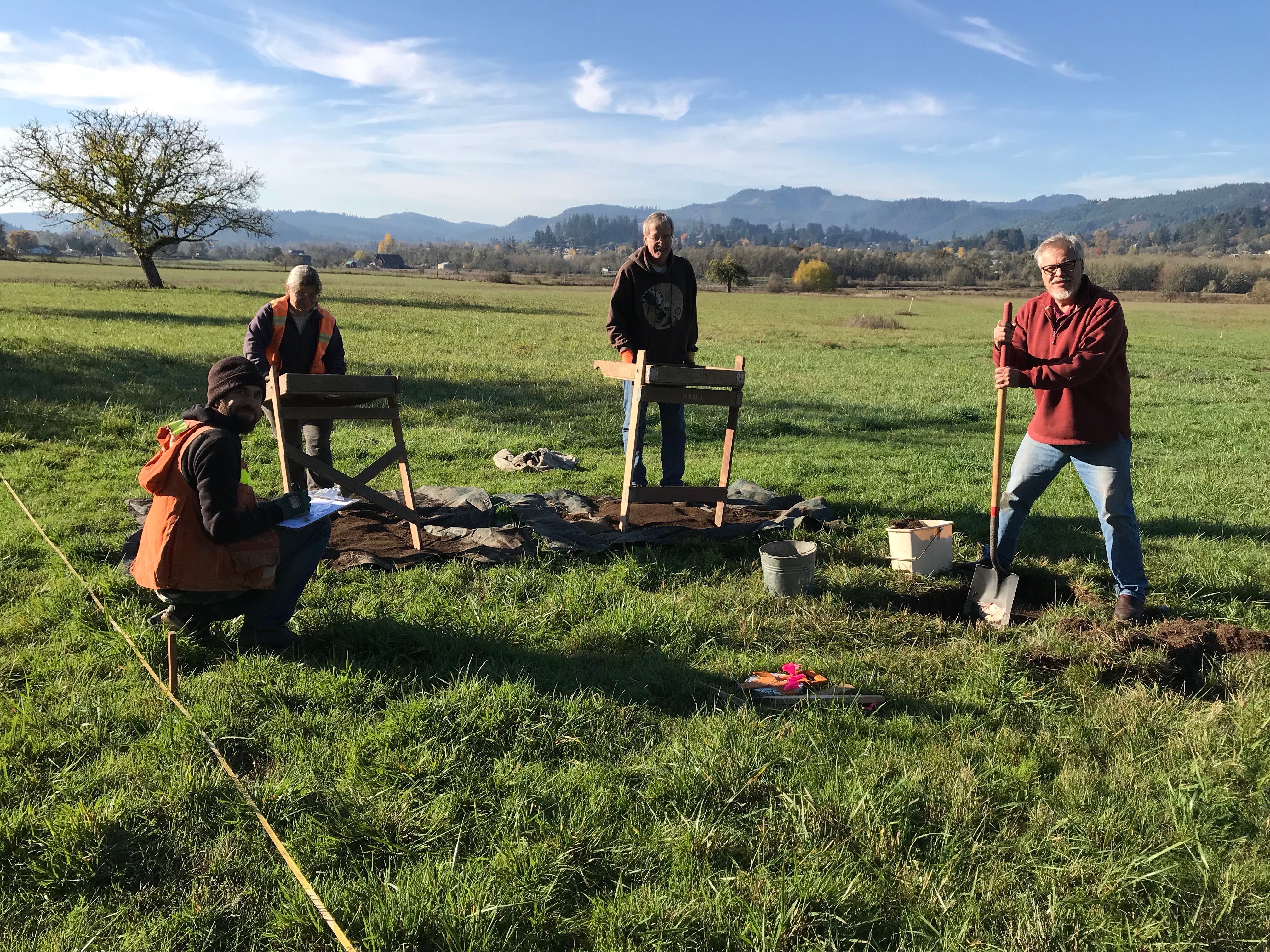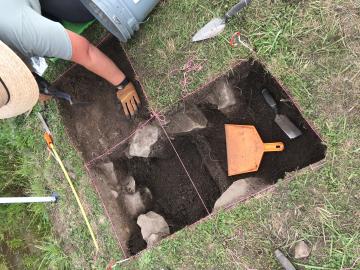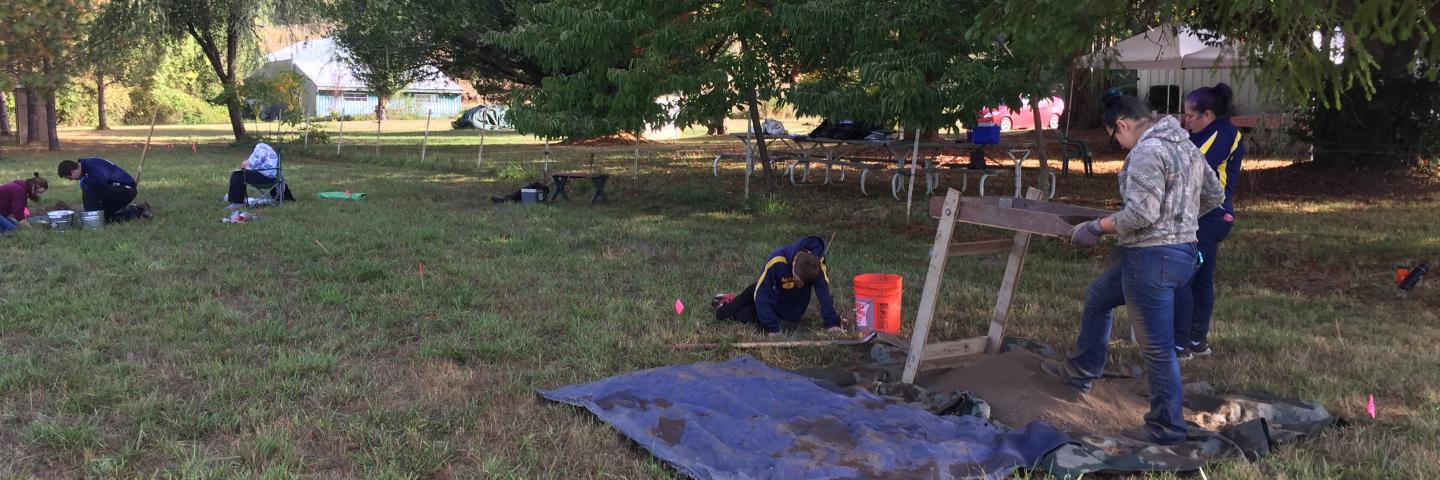Gain hands-on experience in archaeological field work and cultural resource management.
Excavations during the 2025 field season will be focused on the Applegate House and grounds—an historic-era homestead which also has a precontact component. By the end of the course, students will be ready to pursue employment as professional archaeological technicians.
Information about 2026 coming soon.

COURSE
ANTM 408 / 508: FIELD STUDIES IN ARCHAEOLOGY
July 21 through August 15, 2025
Archaeologists Chris Ruiz, Jaime Kennedy, and Andrew Boehm of the Museum of Natural and Cultural History

(MNCH) will teach a four-week archaeology field school at the Charles and Melinda Applegate House near Yoncalla, in northern Douglas County.
This is a 12 credit-hour course designed to immerse students in methods used to excavate, record, collect, and analyze archaeological data through hands-on experience, one-on-one training, and readings. Students will gain experience in a variety of techniques and skills including pedestrian survey and full-scale excavation. Over the course of four weeks, students will learn techniques of excavation, mapping with a robotic total station, sediment description, cataloging, artifact identification, and more. Excavations during the 2025 field season will be focused on the Charles and Melinda Applegate House homestead grounds—an Oregon European-American settlement-period historic-era homestead dating to the early- to mid-1850s, which also has a precontact Yoncalla winter village component. By the end of the course students will be ready to pursue employment as professional archaeological technicians.
12 credits
INFORMATION AND LOGISTICS
This course is designed to provide students with a “hands-on” introduction to archaeological fieldwork through participation in the archaeological research project, lectures, discussion, and professional development activities. Upon successful completion of the course, students will be able to:
- Gain practical experience in site and artifact mapping using a robotic total station and analog measuring devices.
- Describe sediment matrices and understand their implications for site formation processes.
- Learn and practice basic techniques of controlled excavation.
- Recognize artifacts, ecofacts, and features and know how to properly record and sample them.
- Function as a collaborative, respectful, and integral part of a field research team.
- Learn about Applegate House within a broader regional context and historical significance.
- Apply for employment as a professional archaeologist.
Field sessions are open to graduate and undergraduate students. Post-baccalaureate students may register for graduate credit even if they are not yet enrolled in a graduate program.
2025 Course Fees: $3,500
Archaeology Field School students will enroll for 12 credits in ANTM 408/508. A course fee of $3500, for both in-state and out-of-state students, covers tuition and field transportation, and snacks. Students that have completed their bachelor's degree may take this course for graduate credit, with the expectation that graduate level effort will be required. Tools and other materials are provided for the course.
Please send questions to Chris Ruiz at cruiz@uoregon.edu.
Health and accidental insurance is required for all students.
Personal Equipment
- Backpack - for day use (or functional equivalent)
- Wide-brimmed hat
- Sunscreen - at least SPF 25
- Bug spray
- Sunglasses
- Pocket knife
- Canteens - you will need to carry at least 3 quarts
Required Archaeological Field School Equipment
Item | Approx. Cost |
Marshalltown Masonry Trowel (6" x 2¾") or Margin Trowel | $7.00-$15.00 |
Metric Tape Measure (3-5 m) | $10.00-$20.00 |
Paintbrush (2-3") | $6.00 |
Whiskbroom | $8.50 |
Sharpies (2 @ $1.50) | $3.00 |
Wood or Mechanical Pencil and Lead (0.7 mm)(pack of 24) | $4.00-$8.00 |
Work Gloves | $12.00 |
Plastic Tool Box or canvas bag- optional | $15.00 |
Total: | $80.50-$102.50 |
without optional: | $65.50-$87.50 |
The Museum of Natural and Cultural History is delighted to offer the C. Melvin Aikens Scholarship for the 2025 field school to contribute to students' tuition to attend. Selection of this award will be on a needs-based evaluation. If you would like to be considered for this award, please provide a statement of need that explains how receiving the C. Melvin Aikens Scholarship will affect your ability to attend. Apply via the field school application.
QUALIFICATIONS AND EXPECTATIONS
Applicants must be able to meet the demands of excavating and working outside during the southern Oregon summer. Students and instructors work side-by-side and the ability to get along with others is essential.
Archaeology students are accepted from a broad range of backgrounds. The only prerequisites are a serious interest in archaeology and/or history of the local area. Preferred, but not required, prerequisites include some level of personal preparation, including archaeology classes, basic reading in archaeological field methods, or previous participation in an organized archaeological project supervised by a professional archaeologist such as a Passport in Time (PIT) project. All applicants should provide a one-page statement of their interest and experience in archaeology.
The field school is a University of Oregon activity and students are expected to understand and follow the University's Student Conduct Code.
Enrollment is limited. Places not confirmed in a timely fashion are offered to applicants on the waiting list according to level of qualifications and priority of application.
The field school will take place at the Applegate House in the Yoncalla Valley of Southern Oregon. The Applegate House is a National Register-listed property that was built in circa 1852–1856. The house is the centerpiece of the historic property but once had several historic buildings that have not yet been located including the original claim cabin and blacksmith shop. The grounds are maintained and mowed, but students should be aware of common southern Oregon irritants, such as poison oak and ticks.
The class will meet at 8:00 AM Monday–Friday and work will continue through 4:30 PM. Lunch is at noon for ½ hour.
We will travel to and from the site daily, leaving from and returning to Eugene each day. We will conduct fieldwork during four week-long sessions (with weekends off).
Keep in mind that the course schedule is somewhat tentative and will depend on weather conditions and general field progress. Beyond fieldwork hours, students will have responsibilities to complete readings, maintain a field book, and write reports. UO vans will shuttle students to and from the site each day from Eugene.
Applications for 2026 will open soon. Check back in the coming weeks.
The application for field school includes some specific questions that we recommend preparing in advance of filling out the application. Questions include:
Questions? Email Chris Ruiz at cruiz@uoregon.edu.
